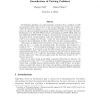Free Online Productivity Tools
i2Speak
i2Symbol
i2OCR
iTex2Img
iWeb2Print
iWeb2Shot
i2Type
iPdf2Split
iPdf2Merge
i2Bopomofo
i2Arabic
i2Style
i2Image
i2PDF
iLatex2Rtf
Sci2ools
147
click to vote
SODA
2012
ACM
2012
ACM
Kernelization of packing problems
Kernelization algorithms are polynomial-time reductions from a problem to itself that guarantee their output to have a size not exceeding some bound. For example, d-Set Matching for integers d ≥ 3 is the problem of
nding a matching of size at least k in a given d-uniform hypergraph and has kernels with O(kd ) edges. Recently, Bodlaender et al. [ICALP 2008], Fortnow and Santhanam [STOC 2008], Dell and Van Melkebeek [STOC 2010] developed a framework for proving lower bounds on the kernel size for certain problems, under the complexity-theoretic hypothesis that coNP is not contained in NP/poly. Under the same hypothesis, we show lower bounds for the kernelization of d-Set Matching and other packing problems. Our bounds are tight for d-Set Matching: It does not have kernels with O(kd− ) edges for any > 0 unless the hypothesis fails. By reduction, this transfers to a bound of O(kd−1− ) for the problem of
nding k vertex-disjoint cliques of size d in standard graphs. It is natur...
Related Content
| Added | 28 Sep 2012 |
| Updated | 28 Sep 2012 |
| Type | Journal |
| Year | 2012 |
| Where | SODA |
| Authors | Holger Dell, Dániel Marx |
Comments (0)

